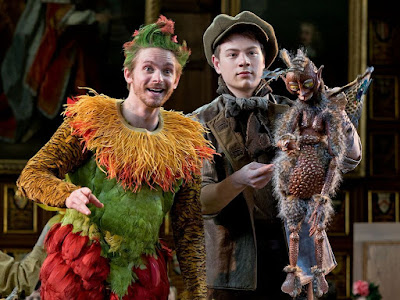 |
| Lucy Thatcher and David North - A Midsummer Night's Dream - © 2016 Celia Bartlett Photography |
Reviewed by Robert Hugill on May 3 2016
Star rating:
Mendelssohn's incidental music in a lively new production of Shakespeare's play in Middle Temple Hall
 |
| Joe Sleight, Sam Townsend and one of the fairies © 2016 Celia Bartlett Photography |
The production director was David Edwards, with Michael Vivian directing the play. James Henshaw conducted the Outcry Ensemble, designs were by Colin Mayes with lighting by Mike Lambert. David North was Theseus & Oberon, Lucy Thatcher was Hippolyta & Titania, Joe Sleight was Puck, Nigel Richards was Egeus & Snout, Mark Hawkins was Lysander, Ben Wiggins was Demetrius, Bebe Sanders was Hermia, Frances McNamee was Helena, Rob Hughes was Bottom, Bobby Hirston was Quince, Sam Townsend was Flute, Michael Luxton was Starveling and Scarlett Neville was Snug. Aidan Oliver was the chorus master of the women's chorus, with Jessica Cale and Lucy Goddard singing the solos.
Mendelssohn's music was written to accompany a performance of Shakespeare's play in Potsdam in 1843, utilising the overture which the young Mendelssohn had written in 1826 The music is best known from Mendelssohn's suite and the larger movements, Scherzo, Nocturne, Wedding March are all intended as intermezzos. Additionally there are the two settings of the fairy songs (Ye spotted snakes from Act Two and the final Through the house give glimmering light) plus much incidental music, either linking passages or melodramas, which hardly makes sense out of context. Interestingly, Mendelssohn confines these musical elements to the fairies and the mechanicals (the melodramas are there to enhance the magical moments from Puck and Oberon), the young lovers are played without any musical elements. In this Mendelssohn's technique was remarkably akin to that of Purcell in his semi-operas, where it was only the minor characters or the non-humans who sang.
At Middle Temple Hall, both play and music were cut, the play substantially so and the music slightly, to bring the playing time in at around two hours 20 minutes. But there was the essence of both to give the right idea, and the cutting of the play was probably true to the original Berlin performances as Henry Irving's famous London performances of Shakespeare were always heavily cut.





.jpg)

.jpeg)





.jpeg)